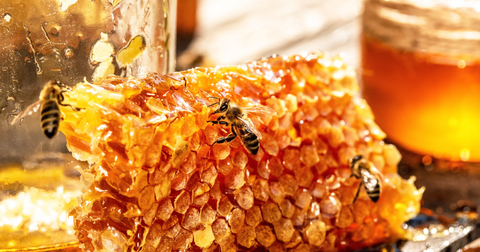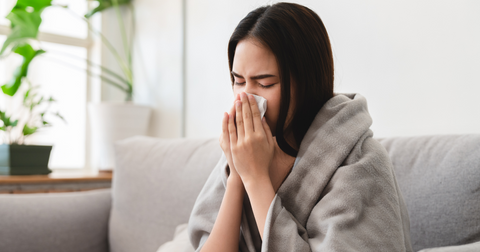Honey has been a golden staple in diets and medicine for centuries. Its uses seem endless, from drizzling it over breakfast dishes to soothing sore throats. But alongside its sweetness and health benefits lies a lesser-known fact: Honey allergies
Often, these common doubts that come to our minds while we talk about Honey are: Can honey give you allergies? How common is honey allergy? What are the signs of a honey allergy, and what are the myths surrounding Honey allergies?
Let's separate myths from facts and shed light on honey's role in causing or soothing allergies.

Can Honey Give You Allergies?
While Honey is generally safe and beneficial, some people might experience allergic reactions to it. But how does this happen? While honey can cause allergies, it's not as straightforward as you might think. The main culprits behind honey allergies are the pollen, bee proteins, and plant allergens found in it, not the honey itself.
When bees collect nectar to produce Honey, they also gather pollen from flowers. This pollen can end up in the Honey and may trigger allergic reactions in individuals who are sensitive to pollen, bee proteins, or plant allergens. It's not the honey itself that's causing the allergic reaction, but rather the pollen, bee proteins, or plant substances carried into the honey during collection.
How Common Is Honey Allergy?
Honey allergy is rare compared to more common allergies like peanuts or shellfish. Most allergic reactions are caused by the pollen within the honey, not the honey itself
However, it's important to note that most people who experience allergic reactions to Honey are likely allergic to the pollen within it rather than the honey itself. Unfiltered, raw honey may contain higher amounts of pollen, which could cause allergic reactions more frequently than highly processed or adulterated honey.
Signs of Honey Allergy
Honey is well-known for its natural anti-inflammatory and antioxidant properties, making it a popular choice for soothing sore throats, promoting skin health, and boosting overall wellness. However, despite these benefits, Honey can sometimes be contaminated with pollen and other plant allergens that bees collect during the Honey-making process. These contaminants can trigger allergic reactions in sensitive individuals.
Symptoms from a Honey allergy may resemble common pollen allergy symptoms. Such as:
# Runny Nose
A runny nose occurs when the nasal passages produce excess mucus as a response to an allergen. This is the body's way of trying to flush out the allergen.
# Sneezing
Sneezing is a reflex action triggered by irritation in the nasal lining. Their body might react by sneezing in an attempt to expel the allergen.
# Swelling
Swelling, particularly in the face, lips, throat, or tongue, can occur as part of an allergic reaction. This happens because the body's immune system releases chemicals like histamines, which cause blood vessels to leak fluid into the tissues, leading to swelling.
# Watery Eyes
Watery eyes are another common symptom of allergic reactions. Increased tear production occurs as the body attempts to remove the allergen.
# Itchy Throat
An itchy throat may result from irritation caused by the pollen or other allergens in Honey. This symptom is often associated with oral allergy syndrome, where the mouth and throat become itchy or irritated after consuming an allergen.
# Rash
A rash can appear on the skin when an individual has a Honey allergy. The body's immune response to the allergen can cause redness, itching, and inflammation of the skin.
# Hives
Hives are red, itchy bumps that appear on the skin when your body reacts to an allergen. In the case of a Honey allergy, hives might appear soon after consuming Honey containing allergens to which you are allergic.
# Bumps on the Skin
Small, itchy bumps can form on the skin as a response to the allergens in Honey. These bumps are a localised allergic reaction where the immune system's response to the allergen causes inflammation in the skin.
Is Honey Safe for Children?
It's important not to give honey to babies under 12 months due to the risk of infant botulism, a rare but serious illness caused by Clostridium botulinum bacteria. While harmless to those over 12 months, this bacteria can release toxins in an infant's intestines, potentially leading to life-threatening complications.
Honey Allergies Myth
Several myths about Honey allergies create misunderstandings about its safety and benefits. Let's clarify some common myths:
#Myth 1: Honey is a Natural Antihistamine
While Honey has anti-inflammatory properties, it is not a substitute for antihistamines or other allergy medications. The belief that honey can cure or prevent allergies is largely a casual observation and not fully supported by scientific evidence.
#Myth 2: All Honey is Hypoallergenic
This is not true. As mentioned earlier, raw or unfiltered Honey can contain pollen and other allergens that may trigger allergic reactions. The type of honey and its processing method can influence its allergenic potential.
#Myth 3: Honey Isn't Safe for Children
Many believe that Honey is unsafe for all children, but this isn't true. Honey is safe and healthy for children over 12 months old, offering a natural source of sweetness, energy, and antioxidants.
It can be a great addition to their diet, whether used in cooking, as a sweetener or enjoyed on its own. While infants under 12 months should avoid honey due to specific health risks, older children can safely enjoy its many benefits as part of a balanced diet.
What is Honey Good For?
While honey allergies are rare and often linked to pollen or bee proteins, honey offers numerous benefits. It's rich in antioxidants for health, provides quick energy for physical activities, and works as a natural moisturizer and acne treatment in skincare.
Health Benefits
#1 Antioxidant Power
Rich in antioxidants, honey helps combat oxidative stress and supports overall health.
#2 Soothes Sore Throats
Provides relief from sore throats and coughs with its soothing properties.
#3 Boosts Energy
A natural source of quick energy, honey can help combat fatigue.
Fitness Benefits
#1 Quick Energy Boost

Ideal for a pre-or post-workout energy boost due to its natural sugars.
#2 Muscle Recovery
Anti-inflammatory properties assist in reducing muscle soreness and aiding recovery.
#3 Hydration Support
Helps maintain hydration levels, which is crucial for effective workouts.
Skin Care Benefits

#1 Natural Moisturizer
Hydrates and softens skin, making it a great ingredient for dry skin care.
#2 Acne Treatment
Its antibacterial properties can help reduce acne and promote clearer skin.
#3 Soothing Agent
Calms irritated skin and can be used to soothe minor burns and cuts.
Conclusion
Honey is a beloved natural product with many health benefits, but its connection to allergies requires careful consideration. While Honey can sometimes trigger allergic reactions due to the presence of pollen and other allergens, these cases are relatively rare. Myths about Honey's ability to manage allergies should be understood in context and always consult a doctor before trying it as a remedial for allergies.
Honey can be safely enjoyed by indulging in its sweet taste and numerous benefits, whether drizzled over breakfast, stirred into tea, or incorporated into various recipes as part of your daily routine.
Visit Honey and Spice to see our collection of The Best Honey available in the market sourced from deep pristine forests to locally sourced farm honey.
Discover the purest and most authentic honey that nature has to offer, perfect for enhancing your health and adding natural sweetness to your life. Don't miss out—experience the rich flavours and benefits of our premium honey by visiting our website Honey & Spice today!







